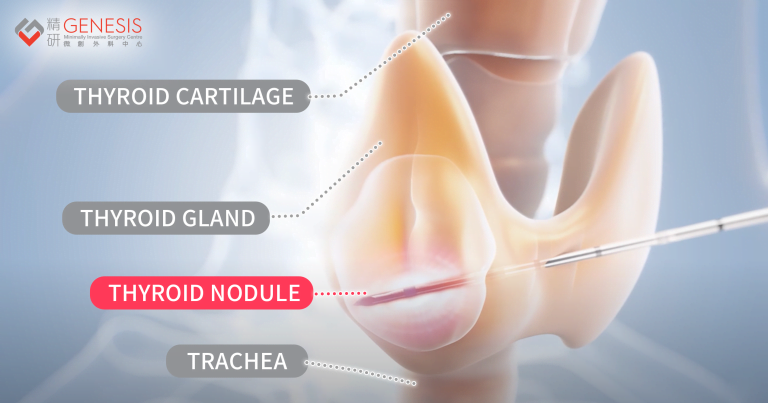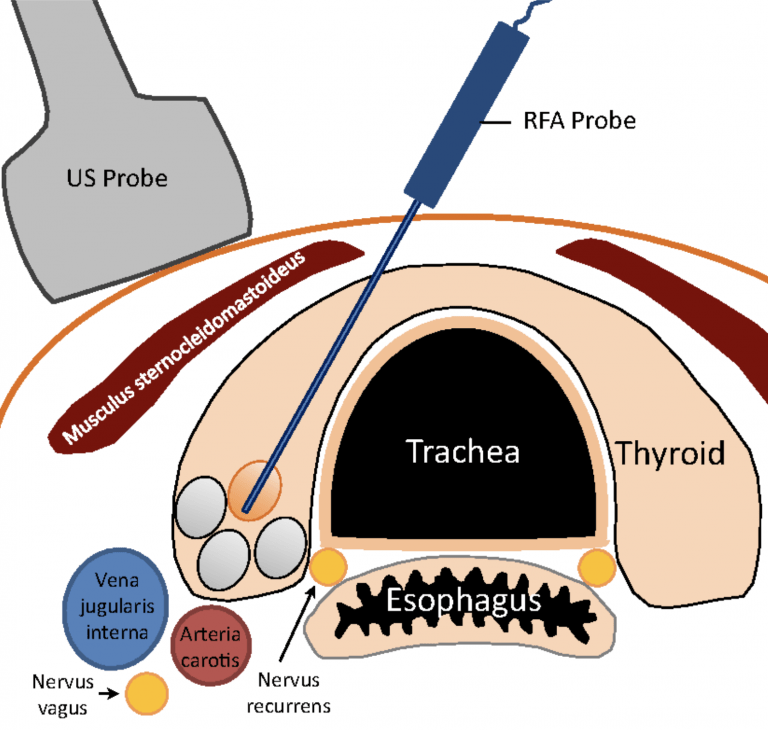Thyroid Radiofrequency Ablation (RFA)
The thyroid gland is a small, butterfly-shaped organ located in the front of the neck, wrapped around the trachea. Hormones produced by the thyroid gland — triiodothyronine (T3) and thyroxine (T4) — help control many vital functions of your body, such as body temperature and heart rate.
A thyroid nodule is an abnormal growth of thyroid cells in the thyroid gland. It can be benign or malignant (thyroid cancer). Over 90% of thyroid nodules are benign.
Symptoms of Thyroid Nodules
People with thyroid nodules usually show no symptoms during the early stage. In some cases, especially if the nodule has become large, it can cause:
- Neck pain or swelling;
- Swallowing difficulty;
- Breathing difficulty.


How Thyroid Nodules Are Diagnosed
Nowadays, many cases of thyroid nodules are found through regular physical examination. If you suspect you have a thyroid nodule, seek medical attention as soon as possible. Using a combination of the tests below, your doctor will assess whether one or more thyroid nodules are present, and determine whether it is cancerous.
- Physical examination: Your doctor feels your neck for any growths or enlargement of the thyroid.
- Ultrasound: This imaging technique provides information about the shape and structure of nodules. It helps rule out the possibility of cancer.
- Fine-needle aspiration cytology (FNAC): If there is a risk of malignancy, a biopsy is usually performed. During the procedure, your doctor inserts a very thin needle in the nodule and removes a sample of cells. The sample is then sent to a laboratory to have them analysed under a microscope. It is an efficient and reliable means for the evaluation of thyroid nodules.
Treatment of Thyroid Nodules
If a thyroid nodule is found to be cancerous, surgery is usually required. If it is benign and does not affect your daily life, your doctor may suggest watchful waiting. You will have to take regular follow-up examinations to monitor the condition. However, if the nodule so large that it affects your appearance, or makes it hard to breathe or swallow, surgery is usually recommended.
Conventionally, as a treatment for cancerous or benign thyroid nodules, it is standard to surgically remove all or part of the thyroid gland – a procedure called thyroidectomy. While it is a generally safe procedure, there are a number of potential risks and side effects, including:
- Low parathyroid hormone levels caused by surgical damage or removal of the parathyroid glands (You will need lifelong medication to supply your body with thyroid hormone);
- Permanent hoarse or weak voice due to nerve damage;
- Postoperative neck scarring;
- Other risks associated with surgery under general anaesthesia.


Thyroid RFA: A Minimally Invasive Treatment Option
Thyroid radiofrequency ablation (RFA) is a non-surgical treatment option for benign thyroid nodules and certain cases of papillary thyroid microcarcinoma (PTMC). During the procedure, the doctor inserts a thin needle into the nodule guided by ultrasound imaging. Radiofrequency energy is emitted from the tip of the needle to destroy the targeted tissue.
Research has shown that this procedure can reduce the size of thyroid nodules by 50% to 90%. Its benefits include:
- Preservation of the thyroid function (avoids the need for a lifetime of medication);
- A simpler and quicker procedure (can be performed under local anaesthesia at a day centre);
- Shorter recovery time;
- No visible scarring.
Serious complications are rare with the thyroid RFA. Side effects such as pain, bleeding, voice change and skin burns are possible, but can usually be effectively mitigated.
Cost of RFA Procedure
At present, thyroid RFA is provided at certain medical institutions in Hong Kong. At Genesis, the cost is approximately HKD$35,000 to HKD$50,000 for each treatment, depending on the size of the nodule and the complexity of the procedure.
* All content in this website is for informational or educational purposes only. If in doubt, you should consult your doctor or other healthcare professionals.
